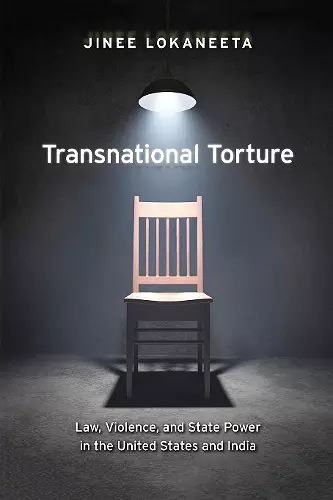Transnational Torture
Law, Violence, and State Power in the United States and India
Format:Paperback
Publisher:New York University Press
Published:22nd Jun '14
Currently unavailable, and unfortunately no date known when it will be back
This paperback is available in another edition too:
- Hardback£74.00(9780814752791)

"Transnational Torture by Jinee Lokaneeta reviewed with Prachi Patankar" on the blog Kafila.
Evidence of torture at Abu Ghraib prison in Iraq and harsh interrogation techniques at Guantánamo Bay beg the question: has the “war on terror” forced liberal democracies to rethink their policies and laws against torture? Transnational Torture focuses on the legal and political discourses on torture in India and the United States—two common-law based constitutional democracies—to theorize the relationship between law, violence, and state power in liberal democracies.
Analyzing about one hundred landmark Supreme Court cases on torture in India and the United States, memos and popular imagery of torture, Jinee Lokaneeta compellingly demonstrates that even before recent debates on the use of torture in the war on terror, the laws of interrogation were much more ambivalent about the infliction of excess pain and suffering than most political and legal theorists have acknowledged. Rather than viewing the recent policies on interrogation as anomalous or exceptional, Lokaneeta effectively argues that efforts to accommodate excess violence—a constantly negotiated process—are long standing features of routine interrogations in both the United States and India, concluding that the infliction of excess violence is more central to democratic governance than is acknowledged in western jurisprudence.
In an original and exciting argument, Lokaneeta suggests that what lies at the heart of the liberal democratic state is the attempt to accommodate and regulate & excess violence. Dazzling in the range of materials it examines, challenging in its conclusions, this is an outstanding contribution to scholarship that recognizes violence to be integral to modern democracies rather than an aberration. -- Nivedita Menon,co-author of Power and Contestation: India after 1989
This book is a valuable resource for anyone keen on understanding why torture remains an integral feature of liberal democracies, as well as for those interested in the American and Indian jurisprudence on torture. -- A. Mazumdar, University of St. Thomas * CHOICE *
Transnational Torture is a truly original study of two liberal democracies rarely compared to each other, and the comparison produces a sum of understanding greater than its parts. Lokaneeta's analysis of American and Indian jurisprudence of custody, confession, police discretion, and the (often exaggerated) distinction between & exceptional and & routine state violence is empirically detailed while also theoretically transcendental and fresh. This book will edify anyone seeking a deeper understanding of torture and the law. -- Lisa Hajjar,author of Courting Conflict: The Israeli Military Court System in the West Bank and Gaza
Situating the post-9/11 debates about torture within the larger tradition of liberal political theory, Lokaneeta employs her nuanced grasp of politics in the United States and India to show why the use of violence in state-sponsored interrogations is less surprising than we might wish it to be. Blending together the best resources of contemporary political theory and comparative political inquiry, her argument explains why recourse to torture in liberal regimes is altogether banal and, at the same time, profoundly disturbing. -- Timothy V. Kaufman-Osborn,author of From Noose to Needle: Capital Punishment and the Late Liberal State
Transnational Torture produces a parallax effect, insightfully exploring a necessary tension within liberal government, while cultivating concern that institutionalized practices and pleasures may manifest a disposition at odds with liberalism itself. . . . Through her close attention to court cases, legislation, and popular culture, Lokaneeta persuasively argues that Giorgio Agamben's paradigm of state power . . . does not allow us to appreciate how instances of excessive violence cannot be contained within the discrete category of an 'exception' in liberal democracies. * Theory and Event *
Those striving to understand the persistence of state violence, and rid society of it, would greatly benefit from reading Transnational Torture. * Himal Magazine *
The book is remarkably rigorous in its examination of the jurisprudence of interrogation, and must be credited for bringing torture squarely into scholarly/academic debates on democracy and the state. * Economic and Political Weekly *
ISBN: 9781479816958
Dimensions: unknown
Weight: 454g
303 pages